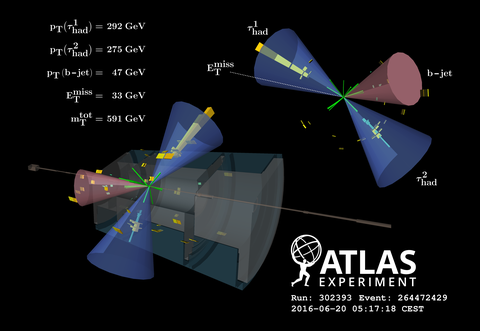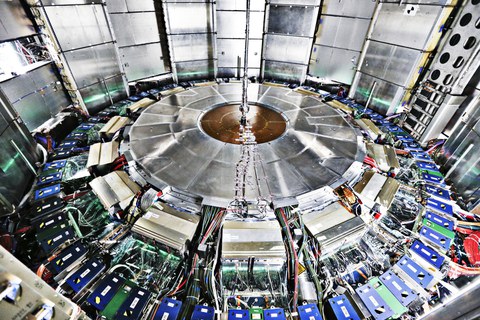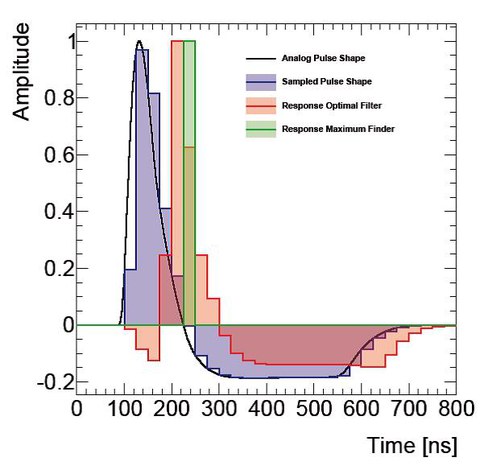Thesis topics
The topics of Bachelor and Master theses that we offer, are closely connected to our research activities. We are active in the search for additional Higgs bosons and new particles beyond the Standard Model and physics with Tau leptons with the ATLAS experiment at the Large Hadron Collider at CERN. We also develop particle detectors for high energy physics and medical applications. Another goal is to transfer new detector technologies to the advanced student labs in particle physics.
The concrete thesis topic will always be adapted to the interest and prior knowledge of each student.
Our current offers are listed here:
Bachelor Thesis, Research Studies Master, Master Thesis in Experimental Particle Physics
- Multivariate analysis, machine learning and artificial intelligence
- Optimisation of data analyses for particle searches and reconstruction of particle decays
- Application and development of software for statistical data analysis
One of the research activities of the ATLAS group at the Institute of Nuclear and Particle Physics is the search for new Higgs bosons in extensions of the Standard Model at the Large Hadron Collider (LHC). A large data set is available from ATLAS Run-2 and Run-3 with a total luminosity of 200 fb-1, which can be analysed. More data are currently being recorded by ATLAS.
In many scenarios beyond the Standard Model, the decay of the new Higgs bosons is into a pair of tau leptons. We therefore study the hadronic decay of such tau leptons in detail, in particular, to obtain a high significance for the Higgs signal, and a large suppression of backgrounds.
In the data analyses, we exploit advanced statistical methods and very often apply methods of machine learning to optimize the selection algorithms or parameter settings.
The topics of the Bachelor and Master theses will be defined individually according to your interest and to the current state of research.
In the thesis project, you will learn software-based methods of data analysis and statistics, the application of machine learning tools, and the use of modern particle detectors.
You should bring a basic knowledge of particle physics. Programming skills would be an asset, but we will also provide introductory sessions to all necessary programming and analysis tools.

pp collision event recorded by the ATLAS detector at the LHC. The picture shows a candidate of a supersymmetric Higgs boson decay into a pair of tau leptons.
Bachelor Thesis, Research Studies Master, Master Thesis in Experimental Particle Physics
- Machine learning und artificial neural networks
- Optimisation of the energy measurement of photons, electrons and hadronic jets with Liquid-Argon calorimeters
- Programming or simulation of electronic and digital signal processing
- Statistical analysis of measurement data
The Liquid-Argon Calorimeters (LAr Calorimeters) of the ATLAS detector at the LHC are going to be upgraded with new readout electronics for operating at highest LHC luminosities. The calorimeter signals shall be reconstructed with improved energy and spatial resolution so that particles produced in proton-proton collisions can be identified with higher precision. The goal is, for example, an improved detection of Higgs boson decays with the ATLAS detector.
The particle identification and energy reconstruction must be performed in real-time, and the time to provide the energy calculation in each detector cell must not take longer than 0.5 μs. For this reason, we use modern and fast programmable electronic circuits, so-called Field Programmable Gate Arrays (FPGAs) for signal reconstruction. We exploit deep learning methods and artificial intelligence to optimize our measurements.
In the Bachelor or Master thesis, the energy reconstruction of the ATLAS LAr Calorimeters shall be improved using machine learning approaches.
In the research project, you will learn the application of machine learning tools (e.g. keras), software-based data analysis, and the functioning of a modern particle detector and electronic readout systems.
If you are interested you may also learn about programming of FPGAs using the programming language VHDL. You can get involved in the application of machine learning algorithms or on advanced data processing procedures running on FPGA devices.
You should bring a basic knowledge of particle physics, and the motivation to learn more about machine learning and/or FPGA programming. Basic programming skills are an asset. We also provide introductory sessions to VHDL and the analysis tools needed for your work.
For more information, please, contact us:
 © IKTP
© IKTP
Group leader
NameProf. Dr. Arno Straessner
Experimental particle physics
Send encrypted email via the SecureMail portal (for TUD external users only).
Institute of Nuclear and Particle Physics
Visiting address:
Andreas-Schubert-Bau, 4. OG, Raum 428 Zellescher Weg 19
01069 Dresden


